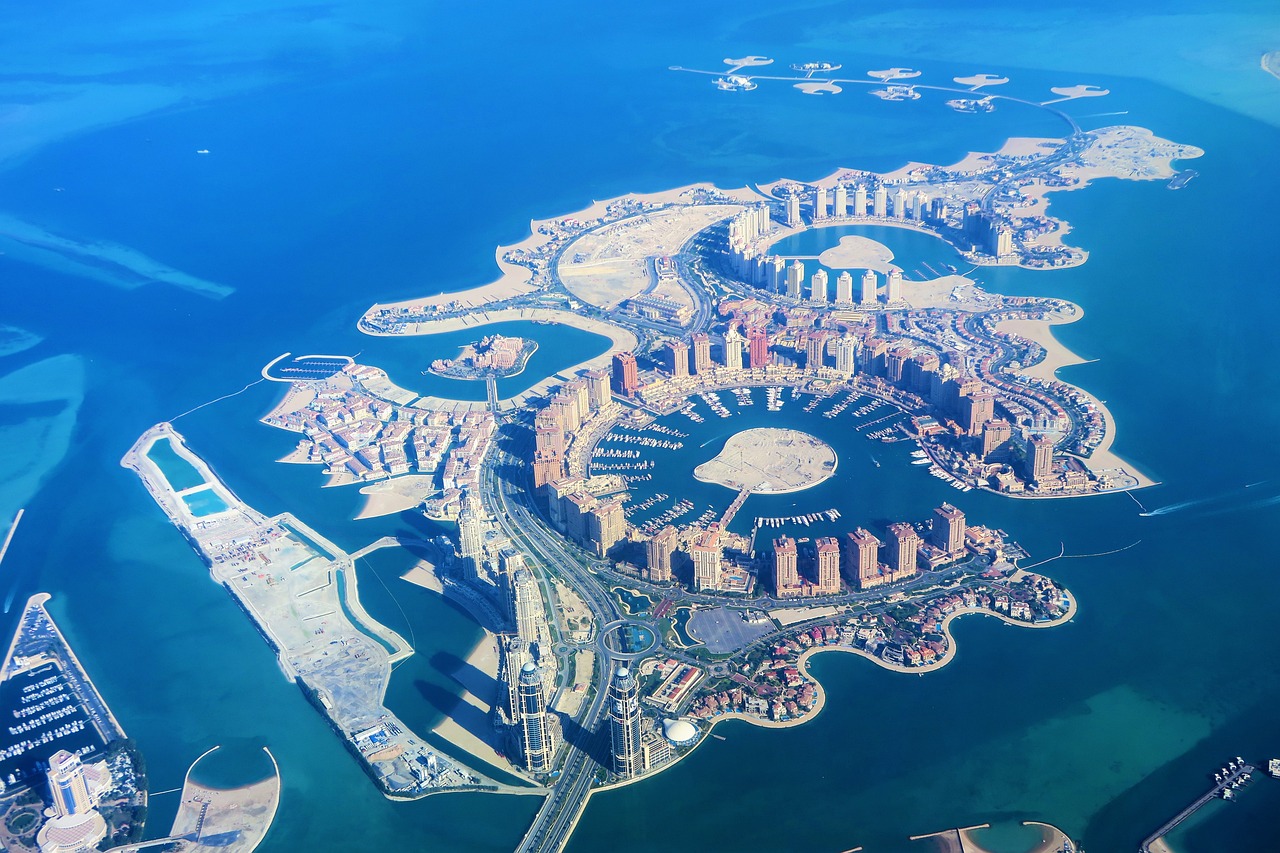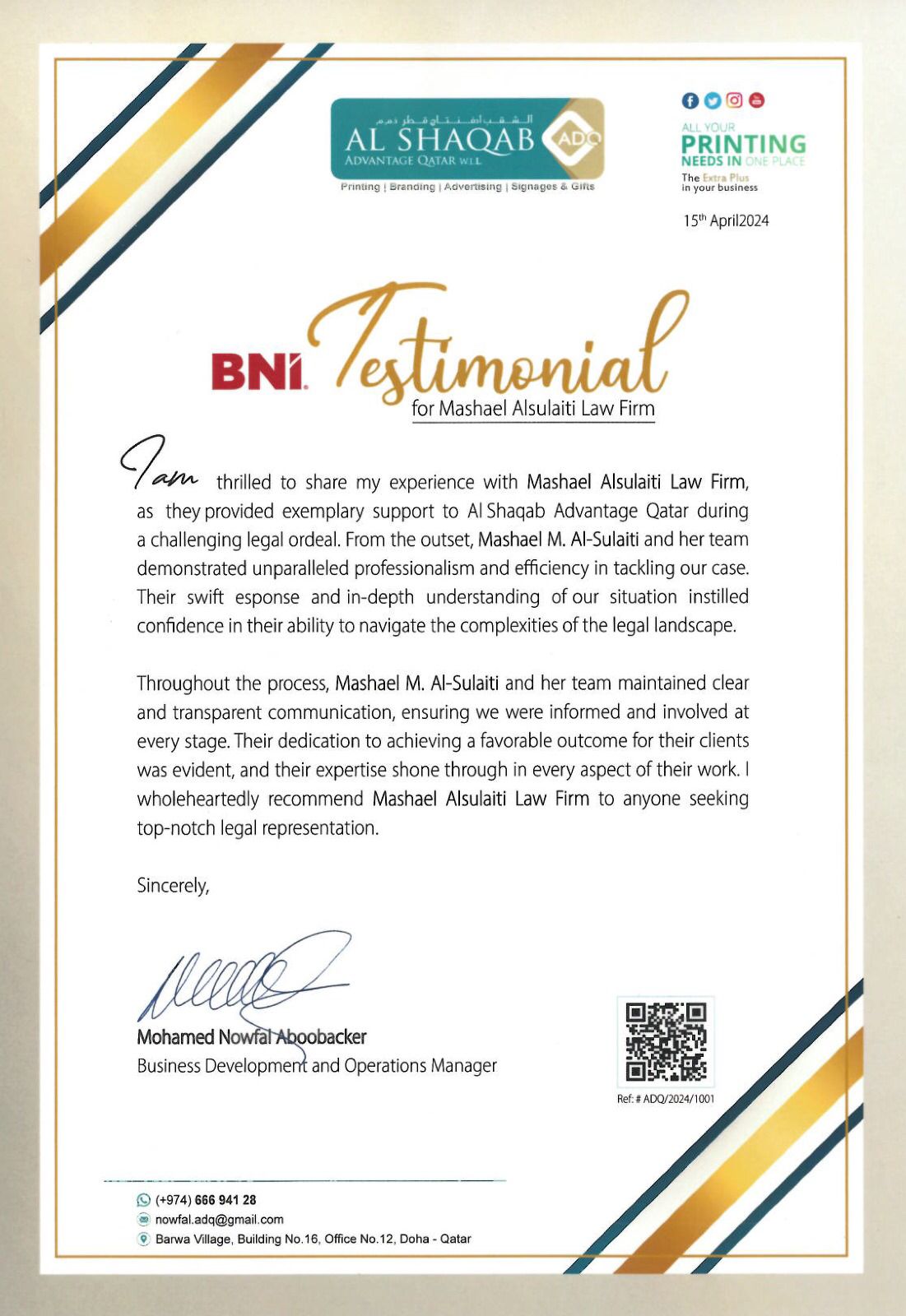Legal Aspects of Qatar's 2030 Vision: Paving the Way for Prosperity and Progress

In the heart of the Arabian Gulf, the State of Qatar has embarked on an unprecedented journey towards prosperity and progress. In recent years, this nation has witnessed remarkable economic growth, leading to an elevated standard of living for its people. Qatar's rise, however, goes beyond economic achievements, as it has also made significant strides in political development, marked by the ratification of its Permanent Constitution in 2005.
At the core of Qatar's ambitious aspirations lies the Qatar National Vision 2030, a comprehensive development plan initiated in 2008. This vision aims to transform Qatar into an advanced society capable of achieving sustainable development and securing a high standard of living not just for the present generation but for generations to come. Central to this vision is Amiri Decision No. 44 of 2008, a landmark declaration that serves as the guiding light for the nation's progress.
Defining Characteristics of Qatar's Future: Opportunities and Challenges
- Prosperity, Modernization, and Tradition
One defining characteristic of Qatar's future is the delicate balance between prosperity and the preservation of traditions. As the nation propels forward, it is determined to modernize while cherishing its rich cultural heritage.
The development of Qatar is driven by a commitment to maintaining cultural values and traditions while advancing on the global stage. This includes investments in heritage preservation and cultural initiatives that celebrate the nation's identity.
- Meeting the Needs of Today and Tomorrow
Qatar's vision extends beyond the immediate generation, addressing the needs of future generations. Sustainability is a key tenet, ensuring that the progress made today benefits not only the present population but also those yet to come.
The nation has undertaken a comprehensive approach to ensure that economic and social progress is sustainable in the long term. This includes investments in education, healthcare, and infrastructure that will support future generations.
- Managed Growth vs. Uncontrolled Expansion
Managing growth is essential to ensure the quality and sustainability of development. The 2030 Vision places a premium on controlled expansion to maintain a high quality of life for all citizens.
To achieve this, Qatar has implemented comprehensive urban planning and development regulations to ensure that growth is well-managed and does not compromise the nation's unique character.
- The Expatriate Workforce and Development Path
Qatar's development is closely tied to the size and quality of its expatriate labor force. The nation has chosen a strategic path that leverages the contributions of international workers while ensuring their rights and well-being.
Amiri Decision No. 44 of 2008 is instrumental in defining the legal framework for labor and immigration, which plays a crucial role in attracting skilled professionals and safeguarding their rights. This has created a dynamic and diverse workforce that contributes to the nation's growth.
- Economic Growth, Social Development, and Environmental Management
Balancing economic growth, social development, and environmental protection is a complex task. The 2030 Vision aims to harmonize these aspects, recognizing that a thriving society is not just economically prosperous but also socially and environmentally responsible.
Legal measures and regulations underpin environmental protection efforts in Qatar. The nation's commitment to sustainability is reflected in the legal framework that promotes environmental responsibility and ensures a balance between economic growth and environmental protection.
Guiding Principles of Qatar's National Vision
The Qatar National Vision 2030 is built upon principles that encompass justice, benevolence, and equality. It embodies the principles of Qatar's Permanent Constitution, which safeguard public and personal freedoms, promote moral and religious values, and ensure security, stability, and equal opportunities.
Qatar's National Vision in Four Pillars
The Qatar National Vision is structured around four fundamental pillars:
1. Human Development
The development of all its people is a fundamental tenet of Qatar's vision. It aims to empower individuals to contribute to the prosperity of society.
Amiri Decision No. 44 of 2008 has laid the legal groundwork for human development, ensuring that citizens have access to education, healthcare, and opportunities that enable them to thrive and contribute to the nation's progress.
2. Economic Development
Qatar envisions a competitive and diversified economy capable of meeting the needs of its people, both now and in the future. Economic development is seen as the means to achieve a high standard of living for all.
Legal provisions in Qatar have facilitated economic diversification and investment, creating an environment that attracts both local and foreign investors. This legal framework promotes business-friendly regulations and policies that drive economic growth.
3. Environmental Development
The 2030 Vision underscores the importance of environmental management that supports economic growth and social development while protecting the environment for future generations.
Legal measures and regulations address environmental concerns, ensuring a balance between economic development and environmental protection. This commitment to environmental stewardship is enshrined in the legal framework.
4. Social Development
The vision strives to create a just and caring society, built on high moral standards, and positioned to play a significant role in the global partnership for development.
The legal framework in Qatar promotes justice, benevolence, and equality. It safeguards public and personal freedoms, upholds moral and religious values, and ensures security and equal opportunities for all.
Legal Aspects and the Path to Prosperity
- Environmental and Sustainability Initiatives:
- International Commitments:
Qatar signed the Kyoto Protocol in 2005, demonstrating its commitment to binding targets and measures for combating climate change.
In 2012, Qatar hosted the Eighteenth Session of the Conference of States Parties to the United Nations Framework Convention on Climate Change, showcasing its dedication to international collaboration on environmental issues.
Qatar played a pivotal role in the success of negotiations leading to the 2015 Paris Climate Agreement and became a signatory to this landmark treaty, reinforcing its commitment to global efforts in addressing climate change.
- National Climate Change Plan:
In September 2021, Qatar's Council of Ministers approved the National Climate Change Plan. This strategic framework is not only aligned with the Qatar National Vision 2030 but also with the UN Sustainable Development Goals (SDGs). The plan outlines comprehensive measures and initiatives to address climate change, reflecting Qatar's determination to build a sustainable and resilient future.
- Legislation for Environmental Protection: Decree No. 30 of 2002 - Law of the Environment Protection.
- Wildlife Conservation: Decree No. 5 of 2006 - Regulation of Trade in Endangered Wildlife Fauna and Flora and their Products
- Natural Resource Exploitation: Decree No. 3 of 2007 - On the Exploitation of Natural Resources
- Labor Reforms
In line with this vision, Qatar has been focused on attracting workers, protecting their rights, and ensuring their safety. Legal decisions, such as those encouraging economic growth and competition in the labor market, play a pivotal role in opening doors for investors, employers, and employees alike. Qatar's commitment to allowing employees to change employers and attracting the best talent is a testament to its dedication to realizing the vision.
Abolishment of Exit Permits: Qatar introduced new laws that eliminated the requirement for the majority of workers to obtain exit permits to leave the country. This change grants greater freedom of movement to workers.
Freedom to Change Employment: Workers are now allowed to change their employment without the need for a No-Objection Certificate (NOC) from their previous employer. This reform provides more flexibility for workers seeking new opportunities.
Non-Discriminatory Minimum Wage: Qatar introduced a non-discriminatory minimum wage to ensure that all workers receive fair and equal compensation for their labor.
Qatar Visa Centres (QVCs): The establishment of 20 Qatar Visa Centres in various countries such as India, Sri Lanka, Indonesia, Nepal, Bangladesh, Pakistan, Philippines, and Tunisia expedites the recruitment process and aims to prevent the exploitation of workers in their home countries. These centers facilitate a smoother and more transparent recruitment process.
Workers' Support and Insurance Fund: Qatar has established a Workers' Support and Insurance Fund, which plays a crucial role in ensuring workers' rights, providing necessary care, and ensuring a healthy and safe working environment. This fund is a safety net for workers, protecting their rights and well-being.
Labour Dispute Resolution Committees: Qatar introduced Labour Dispute Resolution Committees in March 2018 to improve access to justice for migrant workers. These committees aim to settle labor disputes within three weeks of a migrant worker filing a complaint, streamlining the resolution process.
- Foreign Ownership and Investment Reforms
In alignment with the goals articulated in Qatar National Vision 2030, Qatar has undertaken significant legislative measures to attract foreign investment in various sectors of the economy and streamline investors' access to the Qatari market. Notably, the Foreign Investment Law (Law No. 1 of 2019) was enacted, enabling the establishment of 100% foreign-owned companies, complemented by incentives and benefits for non-Qatari investors as per the regulations outlined by the law.
In line with Qatar National Vision 2030, which seeks to attract foreign direct investment (FDI) and establish a knowledge-based and diversified economy, the Qatari government introduced Qatar Law No. 1/2019 to regulate foreign capital's investment in economic activities within the country. This legislation, effective since 25 February 2019, supersedes Qatar Law No. 13/2000 and is designed to boost economic growth and facilitate the transfer of technology and expertise throughout the Qatari market.
Several provisions within Qatar Law No. 1/2019 represent significant enhancements compared to its predecessor, Qatar Law No. 13/2000. For instance, under the new law, foreigners are granted the opportunity to invest in any of Qatar's economic sectors, with a few exceptions. Moreover, the fairness of the application process is ensured, foreign investors become eligible for substantial incentives, and alternative forms of dispute resolution are made available. Qatar's enactment of Qatar Law No. 1/2019 signifies another vital step in refining its legal framework for foreign investment, contributing to a more business-friendly environment for foreign investors.
- Qatar Free Zones:
Qatar Free Zones are pivotal platforms for international investors looking to engage with Qatar and support the implementation of major infrastructure projects outlined in QNV 2030.
These free zones offer a conducive environment for foreign businesses and investors, facilitating trade, manufacturing, and various commercial activities with competitive incentives and ease of operations.
Qatar's Free Zones are strategically located and equipped with modern infrastructure, enabling efficient access to regional and global markets. A key facet of the Qatar National Vision 2030 is the legal framework that supports it. Legal measures are integral to the realization of the vision. They encompass the protection of personal and public freedoms, the promotion of values and traditions, and the assurance of security, stability, and equal opportunities.
Conclusion:
As Qatar's 2030 Vision propels the nation towards a prosperous and sustainable future, it is evident that the legal framework is not just a supporting pillar; it is an essential foundation for progress, prosperity, and the fulfillment of the nation's aspirations. It is this legal framework that will continue to guide Qatar on its path to becoming an advanced society capable of securing a high standard of living for its people for generations to come.
Soha Dammak, Legal Counsel
Mashael Alsulaiti Law Firm
#qatar #doha #LawFirm #QatarVision #2030

